Echoes of the Celtics victory parade less than two weeks earlier were still ringing when Wyc Grousbeck announced in July that Boston Basketball Partners LLC was looking to sell the Celtics for “estate and family planning considerations.”
By late March, the team was sold at a reported $6.1 billion price tag, to a group led by little-known private-equity executive Bill Chisholm.
On the floor, the Celtics have paid little mind to the sale process. They accomplished the rare feat of consecutive 60-win seasons. They beat opponents by a little more than nine points per victory, the third-best margin in the league behind only Cleveland and Oklahoma City. Boston went 11–2 in the 13 regular-season games after the deal was announced.
Boston is inching closer to a second straight title, but the franchise’s future is everything but certain.
It’s not just that the deal has yet to be approved. The transition of power itself remains murky.
Grousbeck plans to continue overseeing team operations through the 2027–2028 season, and there’s unresolved family drama that reportedly contributed to the decision to sell. Plus, the current transaction structure may be against the NBA’s private-equity ownership rules.
And no matter what, the Celtics will owe an unprecedented $270 million in taxes when the Finals are over.
The Grousbecks and other investors purchased the Celtics in 2002 for $360 million. With franchise valuations rising ever higher—and considering the tax implications for keeping it in the family—it’s understandable they would choose to capitalize on that original investment. Especially if you believe the New York Post, which reported that the Celtics sale took place in part because of a rift between Wyc Grousbeck and his father, 90-year-old Irving Grousbeck, who was unhappy over payroll and potential financial losses.
As the attorneys at Massachusetts law firm Samuel, Sayward & Baler LLC explain, if the elder Grousbeck were to die with a Celtics interest, it would be subject to a hefty federal estate tax. Assets worth more than $13.6 million are taxed at a “whopping” 40%, the firm says. By selling his interest, that asset becomes cash, which is “much easier to plan with.”
The transaction as it’s proposed would take place in two parts, with 51% of the Celtics being sold upon approval by the NBA’s board of governors (owners are expected to vote in June). Remaining minority owners can retain their positions until 2028, at which point their shares will be sold for up to 20% more, in accordance with a revenue-based formula set by the league, according to the Associated Press. When all is said and done, the deal is expected to have a final blended valuation of up to $7.3 billion.
The man leading the buying group, Chisholm, hasn’t spoken much publicly since the announcement and is a bit of a mystery man. (The press release for the deal calls him a “lifelong Celtics fan and Boston-area native.”) He’ll be investing in his personal capacity, not through his firm, Symphony Technology Group, and is assuming responsibility for one of the most historic franchises in NBA history with a record 18 banners.

The Chisholm takeover, as currently constructed, is not guaranteed to go through. The existing deal framework will test the NBA’s private-equity ownership rules.
Private-equity firm Sixth Street Partners—a major player in sports that recently purchased a 10% stake in the San Francisco Giants and is among the Celtics buying group—has reportedly committed more money than Chisholm, which is against the NBA’s private-equity ownership rules, first established in 2020.
Fixes are apparently already in the works; Wyc Grousbeck recently said that additional investors are being added to the buying group, including “a lot of former partners.” He also said he’s “doubling down on all of my stuff and putting everything I’ve got to stay in for a while,” although it’s unclear exactly what that means.
The most persistent question for years has been answered: Jayson Tatum and Jaylen Brown aren’t going anywhere, having signed supermax contracts that together total roughly $562 million in guaranteed money (Brown is signed through 2028–2029, while Tatum has an option to extend to 2029–2030). And Derrick White should be around for a while (he signed a four-year deal worth up to $125.9 million over the summer).
But team president Brad Stevens may reportedly try to trade Kristaps Porziņģis and starting guard Jrue Holiday as soon as this summer to shed some salary, and Al Horford will be 39 years old by the time this year’s postseason is over. Next year and beyond, the Celtics are expected to trigger the NBA’s controversial second apron, which was implemented before this season to increase parity with the threat of hefty taxes and penalties. When teams’ total payrolls cross the second apron threshold, they lose roster-building levers like the abilities to use trade exceptions and the taxpayer mid-level exception, which is often used by capped teams to fortify their rotation.
No matter how much maneuvering Stevens does, the Celtics will likely be in luxury-tax land for the foreseeable future. They’re projected to pay almost $228 million in salary next year alone, roughly $10 million more than the team right behind them, the Suns.
If the Celtics don’t make major personnel moves, they could face a total payroll bill of about $500 million, between salary and luxury taxes. The anticipated $270 million tax hit is almost $100 million more than the previous record holder, the 2023–2024 Warriors, who had to foot a $176.9 million luxury tax bill. (Steve Pagliuca, a longtime minority owner who lost the takeover bid to Chisholm, wrote a heated letter to fans last month saying he is “saddened” and that his proposal was “fully guaranteed and financed” and would not have hamstrung the team’s future.)
For head coach Joe Mazzulla and his players, now is not the time to worry about the team’s balance sheet or what the future will hold. The playoffs are underway, and there have been only 13 teams in NBA history that have won at least two consecutive titles. The Celtics have a chance to become the 14th with championship number 19. History is in their grasp.




